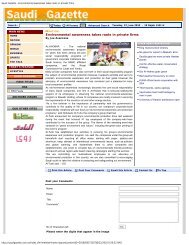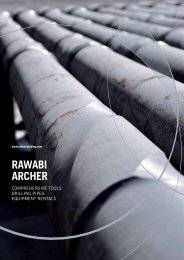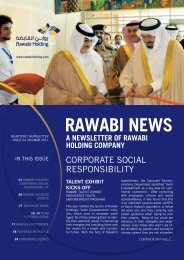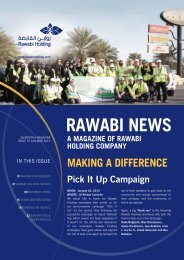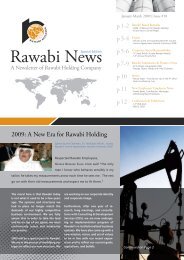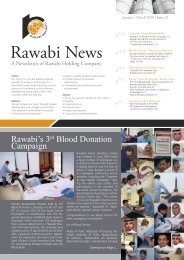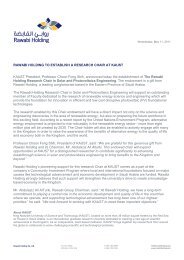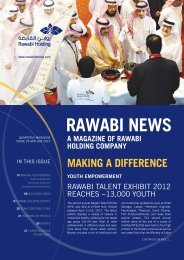Rawabi Holding Newsletter Issue 26
Rawabi Holding Newsletter Issue 26
Rawabi Holding Newsletter Issue 26
Create successful ePaper yourself
Turn your PDF publications into a flip-book with our unique Google optimized e-Paper software.
Team<br />
Contributions<br />
other aspects of the hexagon to fit into<br />
this category, but if you’re realistic<br />
side is dominant, then theories bore<br />
you and getting down and dirty puts a<br />
smile on your face. I think that the majority<br />
of <strong>Rawabi</strong> <strong>Holding</strong> business unit<br />
employees are working in realistic jobs.<br />
Those who are excelling in their areas<br />
would most likely score highest on this<br />
style. Those who are not perhaps have<br />
been misplaced and could do much<br />
better in a less physical position. Food<br />
for thought.<br />
I: Investigative<br />
Those who are investigative love to<br />
work with theories and analyze information.<br />
Lab workers, lawyers, desk engineers,<br />
psychiatrists, researchers and<br />
professors. If you love medicine with<br />
a dominant investigative personality,<br />
then surgery most likely isn’t your cup<br />
of tea, but you’d be an amazing pathologist.<br />
In our company, I would venture<br />
to say that most of us in <strong>Rawabi</strong> <strong>Holding</strong><br />
offices are this way. Field jobs are<br />
not for us. Unless they are, and then<br />
we should re-visit our choices if we<br />
want to be happier at what we do. If<br />
you’re happier and well placed according<br />
to your personality then you would<br />
be naturally productive. Are you<br />
gas or construction would be great at<br />
designing innovative maps and graphic<br />
interpretations of our geology. There’s<br />
still hope. I’d say most Gymboree facilitators<br />
score high here as well. How<br />
fun!<br />
S: Social<br />
Those who are social enjoy helping out<br />
and working in cooperative environments.<br />
Let’s hope that the majority of<br />
us don’t score zero on this style, since<br />
teamwork is so important. Again, I’m<br />
going to venture that Gymboree facilitators<br />
who love what they do score<br />
quite high on this one. Human resource<br />
management is a good area for those<br />
who score highly in this area. So are<br />
those who work in charity and social<br />
responsibility. This is my opportunity<br />
to tell you that I scored highest on this<br />
style. Thank goodness.<br />
E: Enterprising<br />
C: Conventional<br />
Those who are conventional are essential<br />
to every organization’s success.<br />
Their personalities have a natural tendency<br />
toward organizing, paying attention<br />
to detail and precision. See,<br />
again, engineers are often conventional.<br />
But I would not put a conventional<br />
engineer on sight all the time. These<br />
are the people you need to review<br />
your blueprints and double check your<br />
calculations. They are our excellent<br />
accountants and treasurers and our<br />
meticulous executive assistants. Our<br />
editors, our proofreaders and our technical<br />
assistants. We have many, and<br />
without them, our artists would probably<br />
burn down the building.<br />
So there you go. Six interest profiles<br />
that can be applied to a person or a<br />
job. If you share the personality style<br />
with your job placement (i.e. you are<br />
realistic and working in a hands-on job)<br />
then you probably have an easy time<br />
waking up and coming to work in the<br />
morning, with a smile on your face. If<br />
you are unhappy, then perhaps your<br />
skills can be more efficiently utilized<br />
in a similar position, slightly modified<br />
based on your interests. Luckily,<br />
there in fact is a science to it, but<br />
as a culture and a society we, unfortunately<br />
don’t pay much attention to<br />
it. Now imagine that our society does<br />
start paying attention to this. Wait, you<br />
don’t have to imagine—we already are!<br />
<strong>Rawabi</strong> <strong>Holding</strong>’s CSR program is cooperating<br />
with the Ministry of Education<br />
to train counselors in schools to<br />
apply such methods when guiding their<br />
students to make academic and career<br />
choices. Once this program takes off,<br />
we may be sparing parents and their<br />
children years of heartache and a lot<br />
of money. High school graduates may<br />
actually go into college with an idea of<br />
what they want to major in!<br />
If you would like to know more about<br />
your personal cognitive style, I have a<br />
handy tool that would measure it for<br />
you in my office. If you don’t love what<br />
you do, maybe you’re just not doing<br />
what you love.<br />
A: Artistic<br />
A very romantic personality style. Most<br />
of us like to think we are a bit chaotic<br />
and non-conforming, but those who<br />
score highest in this area are dancers,<br />
musicians, painters and writers. Hello<br />
oil and gas sector! Not so much. However,<br />
those of us who do score high on<br />
this type and want to work in oil and<br />
Natural born leaders score very high<br />
in this area. They thrive in competitive<br />
environments and persuasive positions.<br />
It is not a surprise that the majority<br />
of CEOs in the world start out in<br />
sales. If you can convince someone to<br />
buy what you’re selling, then you can<br />
convince someone to believe in your<br />
vision. Business development, sales,<br />
marketing, and management are all areas<br />
where those who score highest in<br />
this area excel.<br />
The tools used to model what’s happening inside our brains are abundant and most<br />
likely they are all useful. Common typological tools are the Myers-Briggs Type Indicator<br />
(MBTI), the Herrmann Brain Dominance Instrument (HBDI) and the Holland Occupational<br />
Themes (RIASEC). Many tools have been created using the Holland Codes, formulated<br />
by psychologist John L. Holland, who argued that “the choice of a vocation is an expression<br />
of personality”. Holland’s model has been adopted by hundreds to measure<br />
people’s cognitive preferences, and they are modeled in a handy hexagon.<br />
22 <strong>Rawabi</strong> News <strong>Issue</strong> <strong>26</strong> Jul-Sep 2011<br />
<strong>Rawabi</strong> News <strong>Issue</strong> <strong>26</strong> Jul-Sep 2011<br />
23



